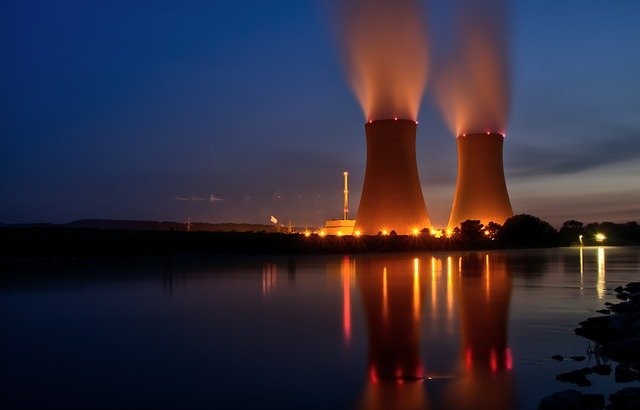We are witnessing major fuel supply issues – with the Ukrainian conflict only demonstrating the West’s continued reliance on Russian oil and gas.
Green energy is the ultimate target but if wind, solar and hydro can only provide a small proportion of the energy required right now – is there an argument for nuclear power?
From a geopolitical perspective, it does at least reduce the dependency on a foreign nation for supply and brings energy supply to home shores.
EU green energy classification
Tal Lomnitzer, portfolio manager at Janus Henderson, certainly believes it may be time to increase investment in nuclear power.
He points to several positive factors that support the nuclear option. Firstly, the European Commission has proposed classifying nuclear power as a sustainable activity under the EU Taxonomy Climate Delegated Act.
Secondly, the uranium market, which fuels nuclear power, has tightened considerably and sources of high quality, socially and economically-viable uranium resources are increasing in demand.
Lomnitzer thinks the EU needs to be creative in its thinking as pressures mount over energy supply issues.
“The European Union is trying to achieve several objectives simultaneously, these include the phasing out of coal, climate neutrality, lower reliance on imported natural gas, as well as greater energy independence and security. The attainment of these goals may be assisted by bringing nuclear power into the mix.”
He adds: “The recent geopolitical turmoil surrounding Russia and Ukraine only serves to magnify some of these issues. While natural gas has many positive benefits that has seen it rapidly displacing coal as a transitional energy source, it is still a non-renewable fossil fuel and cannot be considered truly green nor sustainable in its own right.”
Nuclear power is considered by Janus Henderson’s global natural resources team to be much cleaner than natural gas, as it produces no greenhouse gases.
“It can be an excellent base load electricity supply, providing countries with dependable energy security, which historically was the case in the US, France, Germany, Japan, Russia, and South Korea. Furthermore, nuclear energy is typically produced in countries that are geopolitically stable,” Lomnitzer explains.
He concedes that wind, solar and hydro are cleaner than nuclear because they do not produce nuclear waste, however he stresses that these energy sources are intermittent and require storage and ‘spinning reserve’ (unused capacity) for the energy grid to function effectively. “Nuclear power is the only spinning reserve that does not produce greenhouse gases,” he explains.
Nuclear challenges
A combination of economics, time factors and public perception have typically hindered the growth of nuclear power. Plants are expensive to build and financing is not always easy to find. It often takes over five years to construct a plant before it is operational, and contracts are prone to going over budget.
However, Lomnitzer argues that these are engineering and funding issues, which can be overcome if there is the political will to include nuclear power in a country’s energy mix.
Nuclear power remains controversial because of the risk of rogue production of nuclear weapons. There is also the requirement for long-term storage of nuclear waste and the environmental impact of nuclear accidents – which we saw in Japan in 2011 when a tsunami following the earthquake resulted in three reactor units exploding in Fukushima.
Following the disaster in Japan, Germany shut down its reactors. Understandably, when accidents happen they dominate the headlines and there is enormous pressure to act in the way Germany did. Though, as Lomnitzer points out, the result was an increase in coal-fired power usage – which was itself a backward step in relation to net zero targets.
A new approach
Most of the challenges, Lomnitzer suggests, could be resolved by shifting nuclear fuel from uranium to thorium, from which nuclear weapons cannot be made. “This may take some time because thorium research has been underfunded so the focus is likely to remain on uranium for the foreseeable future. Smaller modular reactor (SMR) units can help mitigate the risk of accidents and have much lower upfront capital requirements, smaller footprints, lower water-cooling requirements, and are being designed with inherent passive safety features that would have avoided previous incidents such as those at the Fukushima and Three Mile Island in Pennsylvania nuclear plants.”
Only this week Rolls-Royce announced the beginning of an approval process for construction of small nuclear reactors in the UK. Funding worth £400m was secured back in November.
SMR power stations are expected to generate up to 470MW of low carbon energy, equivalent to more than 150 onshore wind turbines. The Rolls-Royce share price rose sharply on the back of this news.
In the UK at least, the development of SMRs are a key element of the government’s plan for a green revolution and a move away from a reliance on gas.
Trade offs
There are unavoidable trade-offs everywhere within the energy system. And as Lomnitzer explains while a world powered only by renewable energy would be a wonderful thing, the inescapable reality of managing a power grid is that a ‘spinning reserve’ is required to keep the system stable. “This could be achieved with power storage (batteries), hydrogen or nuclear power, or most likely some combination of all.”
The European Commission’s proposed classification of nuclear power as green energy under the Taxonomy Regulation, due to be finalised later this year, may prove a game changer.
With ‘green’ credentials, nuclear power may be in a position to attract a meaningful slice of the capital being invested in ESG and net zero initiatives.
David Postlethwaite, Sustainable Finance Lead, Jersey Finance, illustrates the levels of investment being made available generally.
“Jersey hosts a number of infrastructure funds that are helping to support enormous global capital needs as the world seeks to de-carbonise its future – it is important to note the $130trn committed by Glasgow Financial Alliance for Net Zero (GFANZ) to net-zero.”









